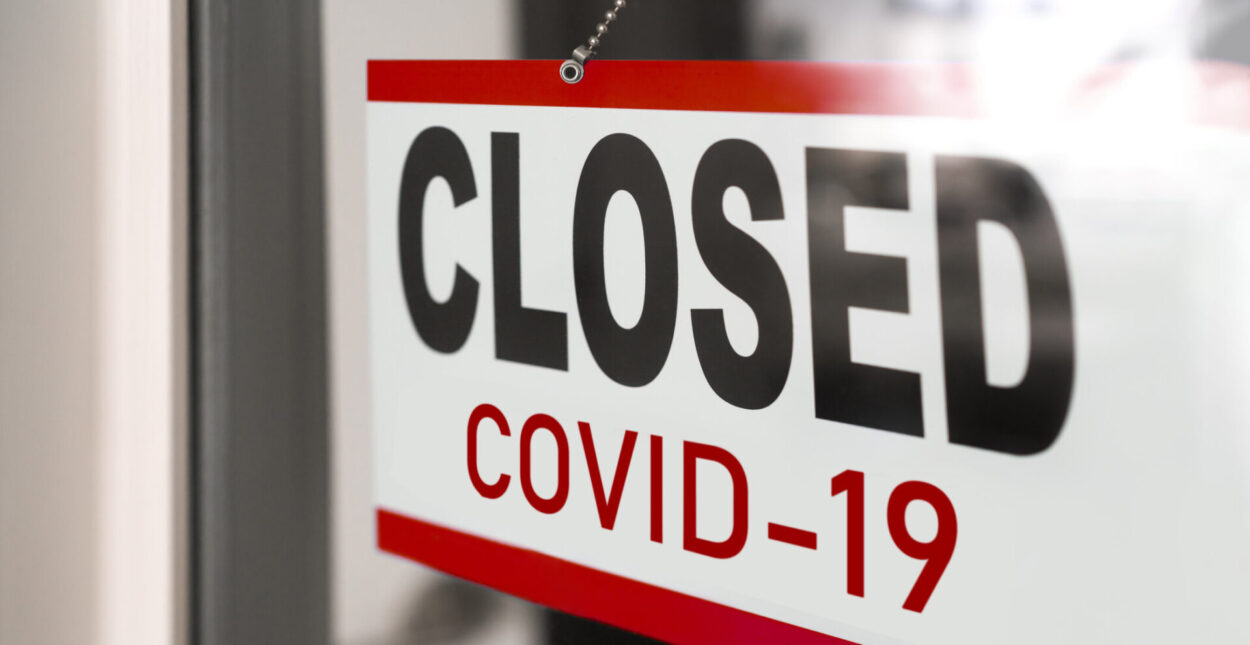Jasmine Birtles
Your money-making expert. Financial journalist, TV and radio personality.

We all saw it coming but Lockdown 2 has just officially been announced. We wanted to bring you information in near-real time to make sure you can start making plans for your finances as soon as possible.

It seemed inevitable – and it turns out, it is. We’re facing a second national lockdown for a month from 2nd November 2020 to 2nd December 2020. It could be the lockdown is extended, too – just as the first one was. The aim is to reduce the number of infections of COVID-19 to try and protect UK citizens from the virus and the NHS from being overwhelmed in an always-busy winter season.
At the time of writing, there are some things yet to be announced. We’re going to keep you posted as things develop!
The good news for those worried about losing their jobs on the last day of the furlough scheme (today) is that they can stay on the scheme for another month. Even better, employers don’t have to contribute the 20% wage that they did in October. This is a national scheme, so it applies throughout November to the 31st March 2021 (updated 5th November).
That means the Government is paying 80% of wages – just like they did in August. Your employer still has to pay your National Insurance and pension contributions (as in August). This means businesses are better off now than during the October phase of the scheme.
You can be furloughed even if you haven’t been furloughed before. Your employer can use the furlough scheme in November if they haven’t used it before, too. As long as you were on the RTI payroll on 30th October 2020, you can be furloughed for November until the end of March 2021. Bear in mind, if you’re a new starter, this does not mean if your CONTRACT date was before the 30th – your accounts team MUST have sent your employee status to HMRC by midnight on the 30th.
So, in summary, November furlough looks like this:
If you were made redundant in the final month of the original furlough scheme, there is a possibility your previous employer can hire you back. If you were employed from 23rd September 2020, or are a new starter on the payroll by 30th October 2020, your old employer can hire you back to furlough you for the next month. They don’t have to take you on, and if the business is officially closed (as in, administration with Companies House rather than simply closed doors), they can’t.
However, it’s still worth a shot to ask. They may not do so, as they’ll need to cover NI and pension contributions. However, in theory, they can take you on if you were on the payroll on or after 30th October.
Employers can also use flexible furlough (the Coronavirus Job Retention Scheme or CJRS) under the new favourable version of the scheme. This means they can bring you back to work for some hours, and the Government pays 80% of the wage of the hours you don’t work. Your employer MUST pay you full wage for all hours you do work – and they are also responsible for your National Insurance and pension contributions for the full contract (not just the hours you work).

This is a biggie. The Financial Conduct Authority has to formally announce this on Monday, but it has already been released in Government guidelines.
If you already have applied for a mortgage holiday, you can top up your mortgage holiday to total six months.
Those who haven’t yet applied for a mortgage holiday can apply for a six-month holiday from Monday. Wait until it’s official – lenders will need a day or two to get their processes in gear for this – but it should be in place very soon!
Remember: these mortgage holidays will not harm your credit rating. However, interest WILL still accrue in the time you’re not paying – so it could extend the cost of your total mortgage owed. The price here is minimal, however, when you consider the short-term advantages (reduced stress being one of the big ones) of taking a holiday.
The FCA has not formally suggested yet that other consumer lending, such as credit cards and car finance, should extend their payment freezes. However, has announced its intention to recommend a six-month holiday for all types of consumer lending. This would mean anyone who has not yet had a payment freeze could have up to six months, while someone who has taken up to three months already on the original freeze terms can extend up to a total of six months.
The existing funding, such as Bounce Back Loans, are still on offer for businesses.
Businesses in England forced to close due to Lockdown 2 will be able to apply for a local grant, depending on their rateable premises value.
The devolved administrations are responsible for their business grant support, with more details expected later this week.
Existing schemes, such as Bounce Back Loans, and the Coronavirus Business Interruption Loan Scheme, have been extended and will be available to new applicants. Currently, the deadline is 31st January 2021.
Some local authorities also offer additional support for businesses without premises or who don’t qualify for other grants or loans. These tend to be micro grants, around £1,000, but the amount and criteria vary. Check with your local authority to find out what’s on offer – and keep checking back, too, as things continue to change.
At the time of writing, there was no further information on the extension or expansion of the Self-Employed Support Scheme. So far, what we know is as before:
The grant was originally supposed to be 20%, then it was 40%, then it was 55% – and then, on 5th November when furlough was extended to March 2021, it was confirmed that the full three months of the third SEISS grant will be for 80% average trading profits of the last three years (not including tax year 19/20).
There is also a fourth SEISS grant to come in February 2021, but the details of this have yet to be announced.
If you weren’t eligible for the SEISS grant previously, you will not be eligible for this third grant. You may also not be eligible for this grant if, for example, business has picked up in recent months and you have not been adversely affected (or won’t be, as it’s in the future!) by 1st Nov 2020.
The furlough scheme can and will apply to all devolved administrations. Even if Wales, Scotland, or Northern Ireland are not in lockdown, the full furlough scheme applies to them until March 31st 2021, the same as England.
Business grants, however, are decided on a regional basis. Further funding opportunities will be announced by the devolved administrations once they are clear on whether to join England for the rest of Lockdown 2 or if they choose to open up (in Wales) following the earlier lockdowns imposed in their regions.
All outbound travel is banned from 5th November to 2nd December, unless it’s for work purposes. This means that, if you had a holiday booked during this time, you won’t be able to go.
Your travel operator should contact you in the next few days to make alternative arrangements. Remember, you’re entitled to a full refund even if they only initially offer you a postponement or a credit note. If your holiday is ATOL protected, your credit note is as secure as cash – if the company goes bust before the credit note expires, you can (eventually) get a refund. However, at the moment, it’s probably better to opt for cash if you can.
Some travel operators won’t offer refunds, however. Michael O’Leary, owner of RyanAir, announced on BBC Radio 4 on the morning of 2nd November that if a flight you booked still runs during the lockdown period, you cannot get a refund – only a credit. And, as they intend to keep running all their flights – because people can still travel for work – it seems likely credit notes will be issued to anyone who had a leisure trip booked in the lockdown 2 period.
If, however, your holiday was a staycation in the UK, you may find it more difficult to get hold of a refund. It’s not impossible, but could take more of a fight! Consider opting for a postponement or credit note in these cases.
You also can’t visit second homes, either. That includes timeshares and holiday sites – which, if you pay ground rent, could mean you’re entitled to a refund on a proportion of the maintenance charge for the duration of lockdown 2. Check with your provider.
Lockdown 2 starts at one second past midnight on Thursday 5th November. (That’s our fireworks night cancelled, then!).
The rules of Lockdown 2 are pretty similar to the original lockdown in March. However, there are a few big differences:
These last two points took a while to come into force with the first lockdown, but are officially in place at the start of Lockdown 2.
If you or your child shows any of the COVID-19 symptoms, you must self-isolate for two weeks. The good news for parents with younger children is that BBC Bitesize is showing educational content for five-to-eleven year olds on the CBBC channel every day – so they can keep up with some learning while still at home.
Anyone told to self-isolate by the Test and Trace app, in receipt of some benefits like Universal Credit, may be eligible to apply for a £500 payment to cover the two weeks’ isolation period. You need to apply to your local council for this payment, and use the unique code provided to you by the app to claim the money.
Other Lockdown 2 rules
It is anticipated that this Lockdown 2 will end on 2nd December – but, like the first one, we could see it extended. That means all of the financial schemes mentioned here may (or may not) be extended, also. Currently, the plan is to ease out of the lockdown using the tiered system that’s been in place for the last couple of months.
At MoneyMagpie, we’ve been at the heart of all these changes and seen how it’s affecting everyone’s finances, not to mention stress and anxiety levels, too. That’s why we do everything we can to talk about the important money issues of the year – things like debt, queries about furlough, and wondering how to do things like buy a house or get married – as much as we can. You’ll have seen Jasmine on TV interviews and heard her on the radio – and that’s not going to stop any time soon!
We want to make sure we’re answering the right questions – the questions YOU’RE asking, right now, about your money worries. Jump on our Magpie Messageboards to post your burning questions – our team will get back to you as soon as we have an answer for you. Or, you can find us on Twitter, Instagram, and Facebook to talk to us and connect with other Magpies, too.

Good clear information for this difficult time.